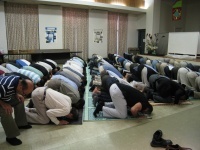
Washington each Friday. The satellite prayer center, created by a board
member of the All-Dulles Area Muslim Society, was started to help
downtown workers who are unable to drive long distances for weekly
prayer. Religion News Service photo by Mallika Rao.
Following attacks on seven U.S. mosques in the last two weeks, including three attacks last weekend, many Muslim Americans are approaching the end of Ramadan on Sunday (Aug. 19) under a cloud of fear as Muslim groups try to increase security without spurring panic.
According to reports, vandals shot paintballs at the Grand Mosque of Oklahoma City on Aug. 12, and in Lombard, Ill., someone threw a bottle filled with acid at an Islamic school while 500 people prayed inside. The night before, a neighbor fired an air rifle at the Muslim Education Center in Morton Grove, Ill., while on Aug. 7, two women were videotaped throwing pig legs on a proposed mosque site in Ontario, Calif.
On Aug. 6, the Islamic Society of Joplin (Mo.) mosque burned to the ground in a case some suspect is arson, while a vandal smashed a sign at the Masjid al-Islam in North Smithfield, R.I. On Aug. 5, four teens in Hayward, Calif., were arrested for throwing lemons at a local mosque, and allegedly shot a BB gun at the mosque in earlier incidents.
All of that comes in the wake of a deadly shooting at a Sikh temple in Oak Creek, Wis., on Aug. 5 that left six people and the gunman dead. While Sikhs are not Muslims, they are often mistaken for them.
The Council on American-Islamic Relations in Washington D.C. issued a safety advisory on Aug. 6, advising Muslims to install surveillance equipment, request extra police patrols, and report suspicious vehicles driving near mosques ahead of Eid al-Fitr, which marks the end of Ramadan.
The Council of Islamic Organizations of Greater Chicago sent a memo to its 63 mosques and organizations, advising them to create safety committees, emergency and evacuation plans to be distributed to members, and to ask police for patrols during Ramadan and peak prayer times.
“We ask our member organizations and the Muslim community in general to exercise extreme caution and immediately report any incidents of harassment, abuse or violence to the appropriate authorities,” said Dr. Zaher Sahloul, CIOGC chairman, in a statement.
“I think people do feel concern about their safety going to and from or being at mosques and in general feeling like prey,” said Kelly Kaufmann, who attends the Muslim Education Center in Morton Grove, Ill., which was attacked.
The Islamic Circle of North America, a nationwide religious organization based in Jamaica, N.Y., does not plan to send-out special warnings.
“By sending a lot of advisories, you can also scare the community, and that is something that we don’t want to do,” said ICNA Vice President Naeem Baig. “Our organization is advising Muslims to practice your faith, be proud of your faith.”
Because CAIR is a civil rights group, Baig said their safety advisory was “appropriate.” “If all Muslim groups started doing the same thing, it could create chaos,” Baig said.
The Arab American Anti-Discrimination Committee was among several organizations that blamed politicians for inciting violence against Muslims, and urged people to condemn xenophobic rhetoric.
For example, Rep. Joe Walsh, R-Ill., whose district is home to the Islamic school in Lombard which was attacked, was videotaped telling supporters on Aug. 8 that radical Islam was in their towns and that Muslims were trying to kill Americans every week. “Walsh is responsible for the assailants’ actions,” the ADC said in a statement.
Walsh's office did not respond to requests for comment.






